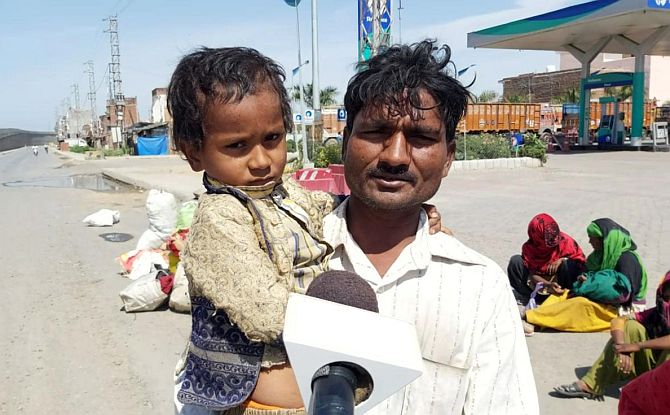Noida SEZ has 400 units and around 100,000 workers, and was shut down on March 23.

There was a time when Mushtaq Ansari (25) would have to race to reach the Noida Special Economic Zone to catch the first shift that began at 7 am.
There was time only to gulp down a glass of milk and a piece of fruit.
Now, there’s no rush. At 10 am, he was making leisurely inroads into a stack of paranthas with pickle and creamy dahi.
There’s nowhere to go, nothing to do. “I’m enjoying it now. But I might get to enjoy it too much,” he says with a grin.
Ansari’s family came to Noida from Bihar 30 years ago and, after a diploma in engineering, he was lucky to get a job in the SEZ, working for a China-based company, PCTPL, which manufactures PVC sheets used for SIM, credit and debit cards.
One of the primary customers of PCPTL is French telecom giant CISCOM.
Noida SEZ has 400 units and around 100,000 workers, and was shut down on March 23.
Ansari says, at the time his company pledged to pay wages to all employees.
But now? His good humour slips a little.
“When COVID-19 broke out in China, they shifted all their orders to us.
"We were looking forward to fat end-of-year bonuses: there was so much work and India could have filled the gap. But now…I’m a bit worried.
"If the company slows down and there is a global lockdown, how can I expect the company to pay my wages? It is, after all, not a khairaat (alms)…” he says.
There is no such ambivalence in either Mahendra Kumar, who worked as a daily-wage attender at a petrol pump, or Hemant Nagar, who worked in the Minda auto components factory in Surajpur.
Although petrol pumps are classified under essential services, there is hardly any business.
All workers have been told not to report to work.
Both Kumar and Nagar are going home - walking because there are neither buses nor trains.
Kumar hopes to hitch a ride on a vegetable or milk truck at least part of the way to Kanpur.
Nagar has to walk around 100 km to a village near Aligarh.
But hadn’t Prime Minister Narendra Modi advised all Indians to stay where they are?
“What can Modiji do about prices? A katta (10 kg) of atta used to cost Rs 260. This morning, it was selling at Rs 400.
"Potatoes have gone up to Rs 40 a kg. Whoever heard of such a thing? We earn Rs 7,000 a month - when there is work.
"Now, there’s no work, no rations, and no money. So we will go home and help with the harvesting,” Nagar said.
His friends chip in. “At least at home there will be no rent to pay. And food is always there on the table…”
But walking 100 km?
“Don’t kanwariyas do it? Navratra has started. We will stop in temples and villages on the way.
"Maybe we’ll get a lift. It isn’t impossible,” Nagar said effervescently.
All along the sides of the Gautam Buddha Nagar highway, many people are leaving, and not all of them will return.
“I’ve had enough,” says Kumar softly. “I’ll help with the katai (harvest) and then just stay in the village.”
These wage-earners are just the tip of the iceberg for police officers tasked with keeping people at home.
Harish Chander, Deputy Commissioner of Police, Central Noida, is holding a briefing for his team, counselling them not to be too strict, but not show any leniency to gawkers and those out for joyrides.
He anticipates problems as people who are confined to one-room homes, get fed up and start spilling out on to the roads.
He says Noida police is making arrangements to organise food delivery in many localities.
But he confesses that it is hard to be patient all the time.
There’s a fracas a few hundred meters away: A policeman is using his baton to thwack at a motorcycle that is breaking the barrier - until the rider shows him the cargo he’s carrying.
It is a rat cage with four squealing, wriggling rats that have to be disposed of.
Hastily the policeman waves the bike through and it vanishes.
Such are the practical problems of managing a lockdown.












 © 2025
© 2025